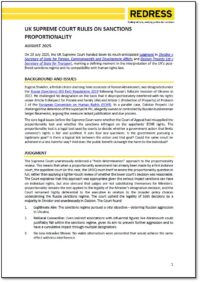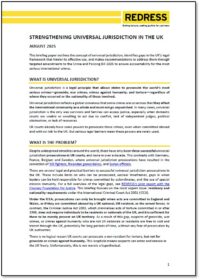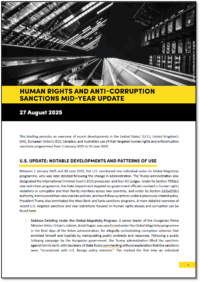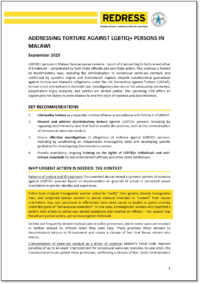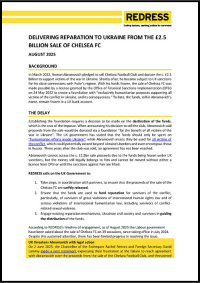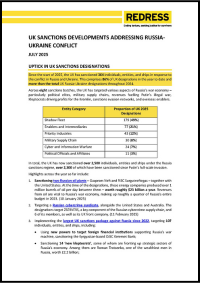Publications
REDRESS’ publications are also available in hard copy format. Please contact us for further information on [email protected].
This briefing covers the UK Supreme Court’s landmark 29 July 2025 ruling in Shvidler and Dalston Projects, which upheld the legality of the UK’s sanctions regime and clarified how proportionality and human rights claims should be assessed. The Court confirmed that sanctions targeting associates of sanctioned individuals are lawful, proportionate, and necessary to deter Russian aggression in Ukraine, reinforcing the UK’s use of economic restrictions as a foreign policy tool.
This briefing paper outlines the concept of universal jurisdiction, identifies gaps in the UK’s legal framework that hinder its effective use, and makes recommendations to address them through targeted amendments to the Crime and Policing Bill 2025 to ensure accountability for the most serious international crimes.
This briefing provides an overview of recent developments in the United States’ (US), United Kingdom’s (UK), European Union’s (EU), Canada’s, and Australia’s use of their targeted human rights and anticorruption sanctions programmes from 1 January 2025 to 30 June 2025.
This factsheet was prepared by REDRESS and Center for the Development of People (CEDEP) ahead of the 50th Universal Periodic Review pre-session. It discusses the widespread torture and ill-treatment of LGBTIQ+ persons in Malawi, driven by discriminatory laws, stigma, and systemic neglect. It also highlights gaps in legal protection, impunity for perpetrators, and denial of justice for victims, and offers key recommendations ahead of Malawi’s upcoming UPR to end violence and discrimination.
In March 2022, Roman Abramovich pledged to sell Chelsea Football Club and donate the £2.5 billion in proceeds to support victims of the war in Ukraine, shortly before he was subjected to UK sanctions for his close connections with Putin’s regime. To date, the funds, still in Abramovich’s name, remain frozen in a UK bank account. This briefing gives on update on the delay and how the UK government can use the Chelsea funds to support reparation for survivors.
This report provides information on REDRESS's activities from 1 April 2024 to 31 March 2025, including a review of our impact and activities, governance and management, a financial review, an Independent Auditors Report, with their opinion on the accounts of the charity for the financial year, and a Statement of Financial activities, with a detailed review of our finances for the year.
This Q&A addresses the disinformation surrounding the International Criminal Court proceedings in the case of Rodrigo Duterte and clarifies key aspects related to the Court’s jurisdiction, his arrest, concerns about victims’ safety, and other relevant issues. It seeks to ensure victims have access to accurate information, enabling them to make informed decisions about their engagement and participation. Some of the questions discussed remain under consideration by ICC judges. This Q&A does not intend to speculate or make legal arguments regarding these matters, but rather to explain what the issues are.
As of July 2025, the UK has sanctioned 364 individuals, entities, and ships in response to the Russia–Ukraine conflict — accounting for 86% of all UK designations this year and already surpassing the total number imposed in 2024. This briefing outlines the key highlights in the UK’s sanctions policy on Russia and Ukraine and analyses significant developments. It also includes an Annex listing all sanctions designations addressing the conflict made in 2025, as of July.
